
Tetris Worlds is a version of the video game Tetris. Originally released in 2001 for Microsoft Windows and Game Boy Advance, it was later released for Xbox, GameCube, and PlayStation 2 in 2002. In 2003, an Xbox Live version titled "Tetris Worlds Online" and a single-disc compilation version were released for the Xbox. The latter was bundled with Xbox systems.

Sonic Advance is a 2001 platform game developed by Dimps for the Game Boy Advance (GBA). It was the first Sonic the Hedgehog game released on a Nintendo console with Sonic Adventure 2: Battle on the GameCube, and was produced in commemoration of the series' tenth anniversary. The story follows Sonic, Tails, Knuckles, and Amy as they journey to stop Doctor Eggman from taking over the world. Controlling a character, players are tasked with completing each level, defeating Eggman and his robot army, and collecting the seven Chaos Emeralds.

It's Mr. Pants is a puzzle video game developed by Rare. It was published by THQ for the Game Boy Advance (GBA) handheld game console in North America and Europe in 2004–2005. A port of the game for mobile phones was developed and published internationally by In-Fusio in 2005–2006. The game stars Mr. Pants, a crudely drawn mascot formerly featured on Rare's website who had made cameo appearances in several prior Rare games.

Ecks vs. Sever is a first-person shooter video game for the Game Boy Advance handheld game console. It was developed by Crawfish Interactive and released in November 2001. The game is based on an early script of the 2002 film Ballistic: Ecks vs. Sever, and is the first video game released before the film it is based on had even begun production. The sequel Ballistic: Ecks vs. Sever was released within a week of the film and follows its plot line more closely than the first game does.
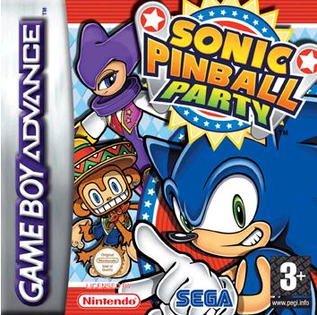
Sonic Pinball Party is a video game released for the Game Boy Advance in 2003. It is a celebration of sorts for Sonic Team featuring many references to its previous games, mostly prominently Sonic the Hedgehog, Nights into Dreams, and Samba De Amigo. There was also a release on a Twin Pack cartridge bundled with Sonic Battle and Sonic Advance respectively in 2005.

GT Advance Championship Racing, known in Japan as Advance GTA, is a racing game developed by MTO and published by THQ. It was a launch title for the Game Boy Advance. The game's sequel, GT Advance 2: Rally Racing, was released on June 30, 2002 in North America.

The Pinball of the Dead is a pinball video game developed by Sega's Wow Entertainment division and published by Sega in Japan and THQ in North America. It was released for the Game Boy Advance on June 19 and July 4, 2002, in North America and Japan, respectively. Based on Sega's The House of the Dead series of light gun games, particularly The House of the Dead and The House of the Dead 2, the game contains three tables and includes a "Challenge" mode. Full-motion video sequences and audio samples from previous games were also added. The game was first announced during the 2001 Nintendo Space World. Composer Hitoshi Sakimoto was involved with making the game's music.

Mat Hoffman's Pro BMX is a BMX video game endorsed by Mat Hoffman and the first game to be published by Activision under the Activision O2 label. It is similar to the Tony Hawk's series and competed directly with Acclaim Entertainment's Dave Mirra Freestyle BMX. Despite a planned release in fall of 2000, the game was released in May 2001 for the PlayStation and Game Boy Color, followed by Dreamcast, Microsoft Windows and Game Boy Advance.
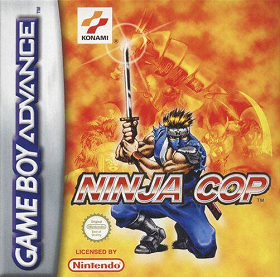
Ninja Five-O, known in the PAL region as Ninja Cop, is an action platform video game developed by Hudson Soft and published by Konami. It was released for the Game Boy Advance in North America and Europe in April 2003. Players take the role of Joe Osugi, a ninja who must stop a terrorist group influenced by mystical masks. It was first announced at "Konami Gamers' Day" in early 2003.
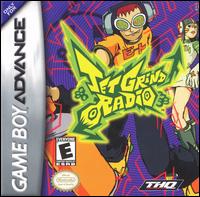
Jet Grind Radio is a video game for the Game Boy Advance system, which is based on the Dreamcast title of the same name. The game was developed by Vicarious Visions and published by THQ.

GT Advance 2: Rally Racing is a rally racing game developed by MTO and published by THQ for the Game Boy Advance, as a sequel to GT Advance Championship Racing. The game features cars from several real Japanese car manufacturers. The player can race on fourteen different courses located in various parts of the world or act as the co-driver. The game was released in Japan on the on December 7, 2001, and in North America and Europe in June 2002. It received generally favorable reviews from critics.
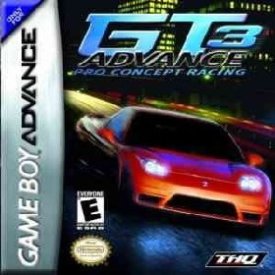
GT Advance 3: Pro Concept Racing, known in Japan as Advance GT 2, is a racing game developed by MTO and published by THQ for the Game Boy Advance. It is the sequel to GT Advance 2: Rally Racing, based heavily on the gameplay from GT Advance Championship Racing, and the third game in the GT Advance series.

Star X is a rail shooter video game developed by Graphic State and published by BAM! Entertainment for the Game Boy Advance handheld video game console. It was first released in North America on April 17, 2002, and later was released in the PAL regions on May 17, 2002.
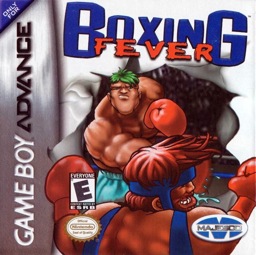
Boxing Fever is a boxing video game developed by Digital Fiction and published by Majesco Entertainment and THQ for the Game Boy Advance. It was released in North America on October 30, 2001, and in Europe on February 15, 2002.

Star Wars: Flight of the Falcon is a video game based on the events of the original Star Wars trilogy of films, developed by British company Pocket Studios. Published by THQ for the Game Boy Advance, the game lets the player pilot various space ships in the battles against the antagonistic Galactic Empire. The story follows the pilots of the space ship Millennium Falcon, Han Solo and his Wookiee co-pilot Chewbacca, as they help save the galaxy from the Empire's forces.

Banjo-Pilot is a 2005 kart racing video game for the Game Boy Advance (GBA) and the fourth instalment in Rare's Banjo-Kazooie series. It plays similarly to the Mario Kart series by Nintendo: the player races one of nine playable characters around tracks, attacking other racers with bullets and collecting power-ups. The game features a number of single-player and multiplayer modes, such as time attack and item hunts. Unlike other kart racing games, characters control airplanes instead of go-karts.
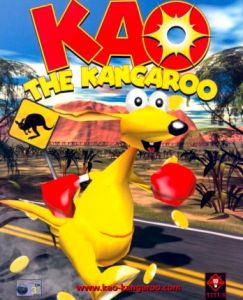
Kao the Kangaroo is a platform video game developed by X-Ray Interactive for Microsoft Windows, Dreamcast and Game Boy Advance. During development it was known as Denis the Kangaroo.

Majesco Entertainment Company is an American video game publisher and distributor based in Hazlet, New Jersey. The company was founded as Majesco Sales in Edison, New Jersey in 1986, and was a privately held company until acquiring operation-less company ConnectivCorp in a reverse merger takeover, becoming its subsidiary and thus a public company on December 5, 2003. ConnectivCorp later changed its name to Majesco Holdings Inc. on April 13, 2004.

MotoGP: Ultimate Racing Technology, known in the United States as simply MotoGP, is a Grand Prix motorcycle racing video game for Game Boy Advance, Xbox, Microsoft Windows, mobile phones, and N-Gage. It is based on the 2001 Grand Prix motorcycle racing season.

F-14 Tomcat is a 2001 action video game released for the Game Boy Advance developed by Virtucraft and published by Majesco. It was an enhanced port of Turn and Burn: No-Fly Zone for the SNES. Two other games for the Game Boy Advance, Super Hornet F/A 18F and F24 Stealth Fighter were built on the same game engine.



















